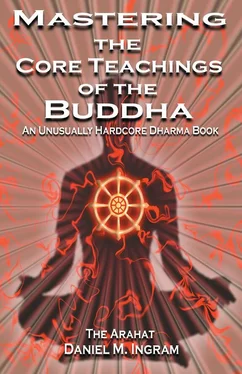Daniel Ingram - Mastering the Core Teachings of Buddha - An Unusually Hardcore Dharma Book
Здесь есть возможность читать онлайн «Daniel Ingram - Mastering the Core Teachings of Buddha - An Unusually Hardcore Dharma Book» весь текст электронной книги совершенно бесплатно (целиком полную версию без сокращений). В некоторых случаях можно слушать аудио, скачать через торрент в формате fb2 и присутствует краткое содержание. Год выпуска: 2009, ISBN: 2009, Издательство: Aeon Books, Жанр: Старинная литература, на русском языке. Описание произведения, (предисловие) а так же отзывы посетителей доступны на портале библиотеки ЛибКат.
- Название:Mastering the Core Teachings of Buddha - An Unusually Hardcore Dharma Book
- Автор:
- Издательство:Aeon Books
- Жанр:
- Год:2009
- ISBN:9781904658405
- Рейтинг книги:5 / 5. Голосов: 1
-
Избранное:Добавить в избранное
- Отзывы:
-
Ваша оценка:
- 100
- 1
- 2
- 3
- 4
- 5
Mastering the Core Teachings of Buddha - An Unusually Hardcore Dharma Book: краткое содержание, описание и аннотация
Предлагаем к чтению аннотацию, описание, краткое содержание или предисловие (зависит от того, что написал сам автор книги «Mastering the Core Teachings of Buddha - An Unusually Hardcore Dharma Book»). Если вы не нашли необходимую информацию о книге — напишите в комментариях, мы постараемся отыскать её.
Mastering the Core Teachings of Buddha - An Unusually Hardcore Dharma Book — читать онлайн бесплатно полную книгу (весь текст) целиком
Ниже представлен текст книги, разбитый по страницам. Система сохранения места последней прочитанной страницы, позволяет с удобством читать онлайн бесплатно книгу «Mastering the Core Teachings of Buddha - An Unusually Hardcore Dharma Book», без необходимости каждый раз заново искать на чём Вы остановились. Поставьте закладку, и сможете в любой момент перейти на страницу, на которой закончили чтение.
Интервал:
Закладка:
If one goes around asking people without very good insight into these things, i.e. the unenlightened, about basic dharma points, points that are obvious to those who have learned to pay attention well, one does not find that everyone already is a person who is perceiving things at the level that makes the difference the dharma promises. Further, even those of lower levels of enlightenment generally have a hard time saying they really are able to perceive the emptiness, luminosity, selflessness, causality, transience, ephemerality, etc. of reality in real-time at all times without having to really do anything. In short, the notion that this is as easy as just being what you already are is wildly off the mark, as the vast majority of people are woefully underdeveloped on the perceptual front in question.
325
Models of the Stages of Enlightenment
Thus, all reality testing reveals that the two schools are missing a very fundamental point: while the universal characteristics are always manifesting in all things and at all times, there are those who can perceive this well and those who cannot, and meditative training, conceptual frameworks, techniques, teachers, texts, discussions and the like can all contribute to developing the internal skills and wiring to be able to fully realize what is possible, as thousands of practitioners throughout the ages have noticed. I myself have known before and after, meaning that I know what I was capable of perceiving and
understanding before I underwent meditative training and after, and no amount of being fed the concept that I was already as developed as I could be, was already enlightened, was already there, had nothing to do, nothing to develop, was already as clear as I could be, was already perfectly awake, etc. was going to make the difference that practicing for thousands of hours over many years did.
It would be like saying: you are already a concert pianist, you just have to realize it, or you already are a nuclear physicist, you just have to realize it, or you already speak every language, you just have to realize it.
It would be like saying to a two-year old: you already understand everything you need to know so stop learning new things now, or to a severe paranoid schizophrenic: you already are as sane as anyone and do not need to take your medicines and should just follow the voices that tell you to kill people, or to a person with heart disease: just keep smoking and eating fried pork skins and you will be healthy, or to an illiterate person with no math skills who keeps having a hard time navigating in the modern world and is constantly ripped off: no need to learn to read and do math, as you are just fine as you are, or saying to a greedy, corrupt, corporate-raiding, white-collar criminal, Fascist, alcoholic wife-beater: hey, Dude, you are a like, beautiful perfect flower of the Now Moment, already enlightened [insert toke here], you are doing and not-doing just fine, like wow, so keep up the good work, Man.
Would you let a blind and partially paralyzed untrained stroke victim perform open-heart surgery on your child based on the notion that they already are an accomplished surgeon but just have to realize it?
Would you follow the dharma teachings of people who feed other 326
Models of the Stages of Enlightenment people this kind of crap? Those who imagine that everyone somehow in their development already became as clear and perceptive as they could be just by being alive is missing something very profound. Do they imagine that you can just remind people of these things and suddenly all wisdom and clarity will suddenly appear? This is mind-bogglingly naive.
I have gained so much that is good and lost so much that is bad by learning to practice well, learning to concentrate, learning the theory, learning insight practices, going through the organic process of the stages over decades, reading the stories, reading about the lives of the great practitioners, having dharma conversations with dharma friends, debating points, wrestling with difficult concepts and how to apply them to my actual life, teaching, learning, studying, playing with the powers, writing, realizing how things are, and delving deeply into the sensate world that I am astounded that anyone would want to try to reduce something so grand, wonderful, deep, rich, amazing and profound to such a paltry, ridiculous concept as the notion that all that is already in place in everyone regardless of what they have done or not done. All those benefits, skills, abilities, powers, states, stages, experiences, insights, and fundamental perceptual changes simply were not available until I did the work, took the time, participated in the process, and no amount of anyone telling me it was otherwise would have helped or made it so.
I know of no examples where the necessary and sufficient causes for the arising of these benefits did not involve some kind of work. In short, I say to those who persist in promoting the Nothing To Do School and the You Are Already There School: STOP IT! You are spreading craziness, and this is craziness that many people will not be able to tell is craziness, and that appears to include those who promote these fallacies.
While I usually do not go so far as to tell people that there is something so deeply wrong with what they think and how they communicate it that they should stop it immediately and forever, this particular point is a great example of something I consider abhorrent and worthy of profound revision.
Regardless of any kind intentions, the teachings of these schools take a half-truth that seems so very nice and seductive to us neurotic practitioners who just can barely stand another achievement trip and 327
Models of the Stages of Enlightenment
have such a hard time with self-acceptance and turn that distortion into sugary poison. There is no need to tie the three useful concepts of 1) no-self, 2) self-acceptance in the ordinary sense, and 3) the notion that the sensations that lead to understanding if clearly perceived over and over again are manifesting right here, right now, to such a perversely twisted yet seemingly benign and similar concepts as the ones they unfortunately promote.
FINAL POINTS
Spirituality that ignores or covers up our inevitable dark or undesirable sides is doomed to be bitten and burned by them. Models of realization that involve high ideals of human perfection have caused so much dejection, despair and misguided effort throughout the ages that I have no qualms about doing my very best to try to smash them to pieces on the sharp rocks of reality. They are not completely useless, and there is some value in keeping the standards to which we aspire high as we will see in the next chapter, but most of the time are taken way too seriously to be helpful at all.
It is clear that those who adhere the most rigidly to the self-perfection models of enlightenment are also very often those who believe enlightenment is the least attainable and feel the most disempowered in their practice and spiritual life. Not surprisingly, those with the highest standards for what realization will entail often have the lowest standards for their own practice and what they hope to actually attain in this lifetime. They are the armchair quarterbacks of the spiritual path. Becoming grandiose about aspiring to a high ideal seems to be a common coping mechanism for dealing with a lack of
confidence and insight. As Christopher Titmuss, one of my best and most honest teachers, often says, “We do not come from a self-perfection lineage.” There are those who do explicitly come from self-perfection lineages. I wish them good luck. They’ll need it.
328
Mastering the Core Teachings of the Buddha
31.SO WHAT’S “FULL ENLIGHTENMENT”? *
This has been a source of considerable debate, confusion and division in Buddhism, particularly between the three main traditions of the Theravada, Tibetan, and Zen. I am going to jump into the fray, as is my typical style, but realize that it is going to be a messy business. These debates tend to boil down to arahats vs. buddhas, a distinction I hope to make clear shortly. Zen is largely on the side of buddhas, though their intriguing vagueness on the subject can at times make it somewhat uncertain what they mean by “buddha.” Most of the time the Zen kids actually seem to mean “arahat” when they say “buddha,” though I wouldn’t go around saying that if you want to be liked. In my more cynical moments, I think their models end at stream entry. On the other hand, the most mythological descriptions of arahats in the Theravada are often closer to the stylized descriptions of buddhas, so the problem is obviously widespread and goes both ways. All kinds of absurd tensions and divisions have arisen around this one point between the Theravada and the Mahayana when, at least in terms of actual dogma, there is really no conflict. How these ideals relate to non-Buddhist traditions is complex, and I offer the simple notion that these things all converge rather than diverge at this level.
Читать дальшеИнтервал:
Закладка:
Похожие книги на «Mastering the Core Teachings of Buddha - An Unusually Hardcore Dharma Book»
Представляем Вашему вниманию похожие книги на «Mastering the Core Teachings of Buddha - An Unusually Hardcore Dharma Book» списком для выбора. Мы отобрали схожую по названию и смыслу литературу в надежде предоставить читателям больше вариантов отыскать новые, интересные, ещё непрочитанные произведения.
Обсуждение, отзывы о книге «Mastering the Core Teachings of Buddha - An Unusually Hardcore Dharma Book» и просто собственные мнения читателей. Оставьте ваши комментарии, напишите, что Вы думаете о произведении, его смысле или главных героях. Укажите что конкретно понравилось, а что нет, и почему Вы так считаете.












